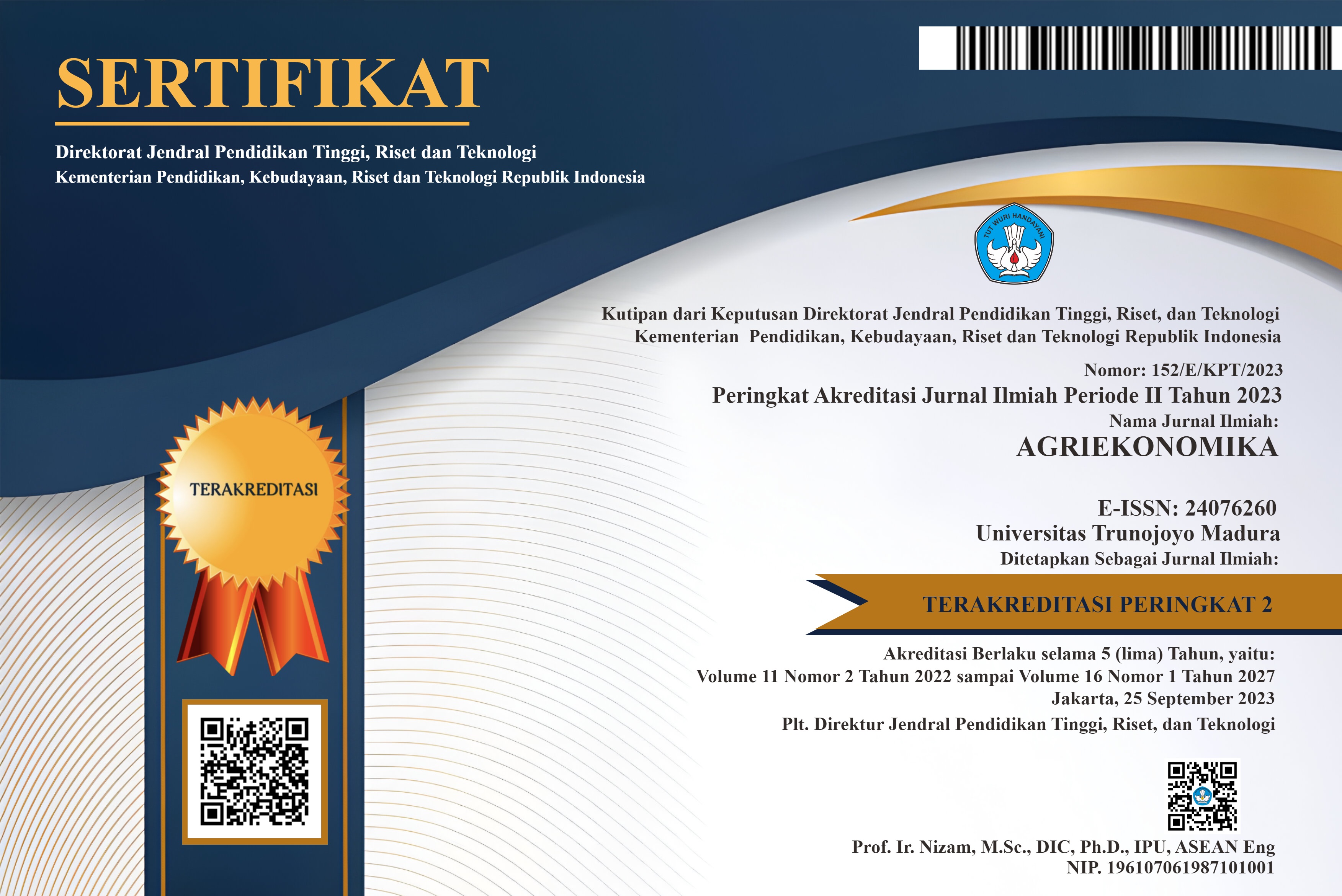PERILAKU KONSUMEN TERHADAP MANGGAARUMANIS DI TIGA KOTA BESAR DI INDONESIA
Abstract
ABSTRACT
The value of imports of fruit in Indonesia also continued to increase, and in the reality import of the fruit is not least of which is a tropical fruit that can be grown in this country and has been cultivated on a massive scale by farmers, one of themis mango ofArumanis. On the other hand, consumer behavior tend to be very complex and is influenced by emotions, motives and attitudes.For the reason the understanding of concerning behavior of consumer become relevant because the information generated has aspects to like to (a) devise a strategy development, production and marketing of the product, (b) compile policy of public related to protection of consumer and producer and (c) continue with new ideas to producers to not merely sell products and to consumers to be more careful and prudent in making decisions.Research location is three metropolisincluding especial consumer of horticulture product that is Jakarta (DKI), Bandung ( West Java) and Padang ( West Sumatra). Responden of consumer survey is selected household consumer at random. Amount of consumer responder in] third the town is West Java = 123 people; Glorious DKI = 110 West Sumatra and people = 106 people, become totally = 339 people.The main analytical tool used is descriptive statistics, cross tabulation, chi square test and the Kruskal Walls to determine the relationship of various product attributes and socio-economic conditions through the use of SPSS statistical program. The results showed the majority of respondents have age between 30-49 years or are of childbearing age, with the majority of education above high school and is a housewife who works.Somewhat different characteristics occurred in Padang where housewives mostly working (70.8%), education <SLTA whicha little (1.9%) and > SLTA large enough (61.3%), while in Bandung partially big housewife does not work (53.7%). Taste is an indicator of the most dominant in the purchase arumanis mango, flesh color followed. The first criterion is the most preferred by consumers in the city of Jakarta and Padang having arumanis mango scent, 4biji/kg fruit size, price Rp. 4,000-Rp. 6.999/kg, was the order of the two is the fragrant aroma of mango Arumanis, 2biji/kgfruit size, price Rp. 4000 to Rp. 6.999/kg, is for the city of Bandung was the first order is preferred by consumers that have a mango Arumanis fragrant aroma, fruit size 2biji/kg, price Rp. 4,000-Rp. 6.999/kg and order both mango Arumanis having fragrant aroma, fruit size 4biji/kg, price Rp. 4,000-Rp. 6.999/kg.
Keywords: Mango of Arumanis; Consumen behavior; Jakarta; Bandung; PadangKeywords
Full Text:
PDF (Bahasa Indonesia)References
Ackerman, F. 1997. Consumed in Theory: Alternatif perspective on the economics of consumption. J. Of. Econ. Issues, vol 31, 651-664.
Adiyoga, W. 2011. Segmentasi Konsumen Kentang, Bawang Merah dan Cabai Merah Berdasarkan Peubah Sosio- Demografis dan Kepentingan Kriteria Produk
Cooley, J.P. and D.A. Lass. 1998. Consumer benefits from community supported agriculture membership. Rev. Of Agric. Econ. Vol 20, 227-237
Dolnicar, S. 2003. Using cluster analysis for market segmentation. Typical misconceptions established methodological weakness and some recommendations for improvement, J. Of Market Res, 11(2), 5-12.
Gough,I.1994. Economic institutions and the satisfaction of human needs. J. Of Econ Issues, Vol 28, 25-66.
James,J.S., B.J.Rickard and W.J.Rossman.2009. Product Differentitation and market Segmentation in Apllesauce: Using a choice Experiment to Assess the Value of Organic, Local and Nutrition attributes. Agric. And Res. Econ. Rev. 38(3):357-370
Ketchen D,J. And C.L. Shook. 1996. The Application of cluster analysis in strategic management research: An analysis and critique. Strategic Management Journal, 17(6), 441-458
Kim,R. And M Boyd. 2004. Identification of Niche Market for Hanwoo Beef. Understanding Korean consumer Preference for Beef Using Marke Segment Analysis. Int Food and Agribusiness Mnag. Review, 7(3):46-64.
Norton,B.R. Constanza, and R.C. Bishop. 1998. The evolution of preferences: Why ‘sovereign’ preferences may not lead to sustainable policies and what to do about it. Ecol. Econ.,vol 24, 193-211.
Ruslan,K. 2012. Impor rambutan.http://kadirsblog.blogspot.com.22 may 2012.
DOI: https://doi.org/10.21107/agriekonomika.v1i2.358
Refbacks
- There are currently no refbacks.







